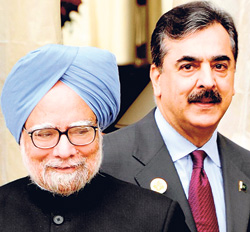SLAMABAD (Reuters) - Prospects have brightened for an improvement of ties between nuclear-armed India and Pakistan after their prime ministers met, but distrust lingers and a big militant attack in India could swiftly shatter any progress. Indian Prime Minister Manmohan Singh and his Pakistani counterpart, Yousuf Raza Gilani, met on Thursday while in Bhutan for a summit of South Asian leaders.
 |
| Manmohan Singh and Yousuf Raza Gilani at their bilateral meeting in Bhutan this week. AFP |
Both sides hailed the first meeting between the leaders in nine months as a good step towards renewing dialogue that India halted after an assault on the Indian city of Mumbai by Pakistan-based militants in November 2008.
The United States has been pressing both countries to ease tension to allow Pakistani forces to turn their attention from the Indian border and focus on battling al Qaeda and Taliban militants on Pakistan's western border with Afghanistan.
"The only success is that they have agreed that they should talk but the details are not settled," Pakistani security and political analyst Hasan Askari Rizvi said on Friday. "It's a kind of a half-way house which they are trying to build." Pakistan has been pressing for the resumption of broad talks, known as the composite dialogue, in which all problems, including the disputed Kashmir region, border disagreements, and trade and sporting ties, would be tackled.
India broke off those talks after the Mumbai attack and is reluctant to rush a resumption until Pakistan acts against the planners of that carnage. Pakistani Foreign Minister Shah Mehmood Qureshi said in Bhutan the present round of talks was unconditional and all issues were on the table.
But Rizvi said Qureshi was giving the wrong impression in suggesting India had agreed to resume the full, suspended talks.
"The dialogue that got suspended is not going to be revived. India has made that very clear," he said, adding that means the two sides will have to agree on a common agenda for new talks.
"Mistrust is still there. They have only agreed to talk because India wants to deflect international pressure," he said. "Their priorities are still different and they have not agreed to the format of dialogue." Indian foreign policy analyst C. Raja Mohan also said much needed to be done to get a talks process back on track.
"The two governments have much work to do before the Indo-Pak peace process finds the stable footing that it had enjoyed during 2004-2007," Mohan wrote in the Indian Express newspaper.
"The biggest challenge ... is the fact that Indo-Pak relations are so accident-prone; and opportune moments are rare and fleeting," Mohan said. |


